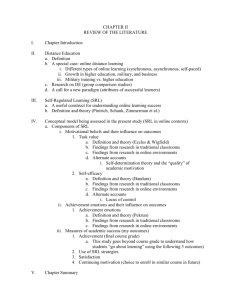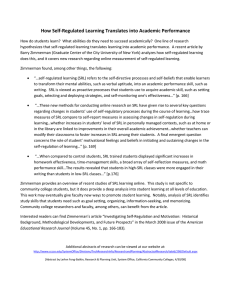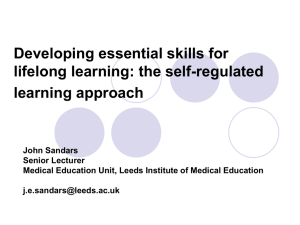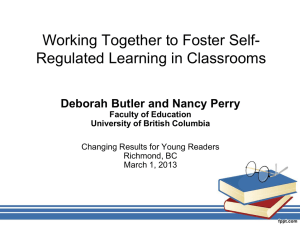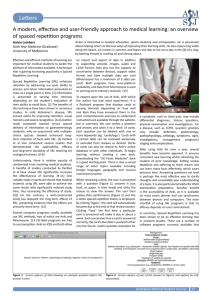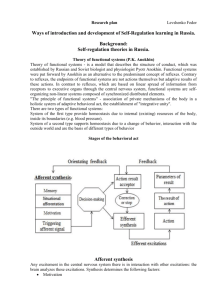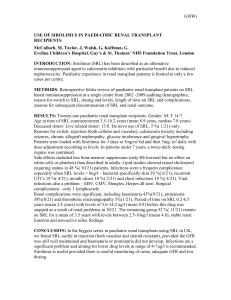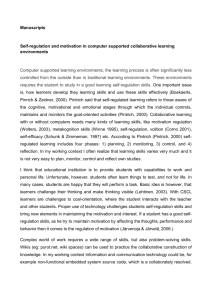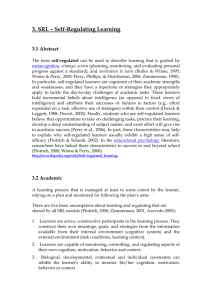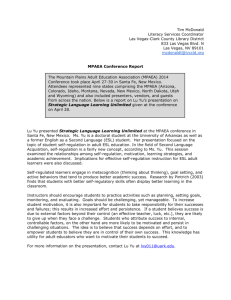SRL-ProD-Day-Oct-25
advertisement
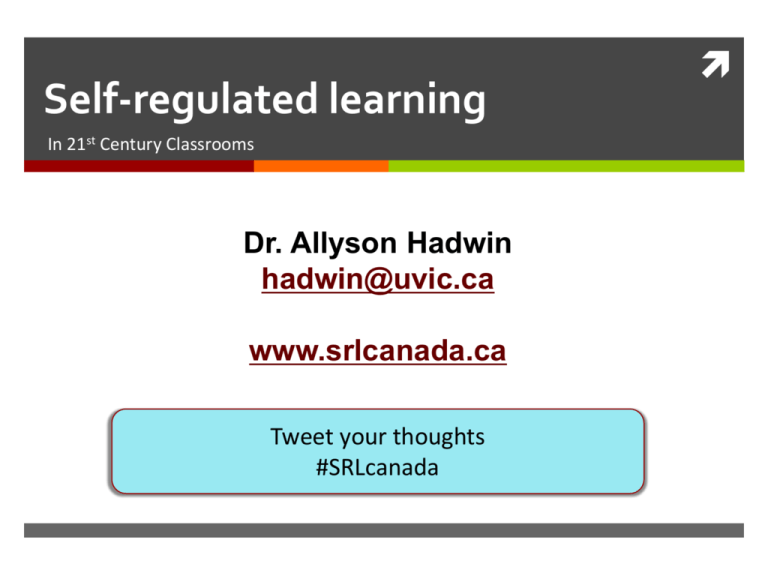
Self-regulated learning In 21st Century Classrooms Dr. Allyson Hadwin hadwin@uvic.ca www.srlcanada.ca Tweet your thoughts #SRLcanada Warm up activity What do you know about self-regulated learning? K W What do we know? What do we want to learn? ✔ ✔ L New Surprising Confusing Exciting ✗ Who Am I? • • • • Associate professor in Educational Psychology Co-director of the Technology Integration & Evaluation Research Laboratory Instructor for ED-D101: Learning strategies for University Success Research: Regulation in learning Tools & Technologies Instructional Principles, Designs, and Strategies Support Student Engagement & Learning 4 What do I believe learning? COMMITTED TO EVIDENCE-BASED PRACTICE • Learning is a lifelong process Learning involves cognitive work • Learning requires reflection &metacognition • • Learning is social • Learning grows from challenges 4 2013-09-09 SRL Consortium “Self-regulation” has been researched since the 1970’s with a focus on classroom practices and learner processes that involve active, strategic learning and engagement in authentic classroom tasks SRL Canada: Canadian Consortium for Self-Regulated Learning (see http://srlcanada.ca/) includes many internationally renowned researchers working here in BC, with educators across multiple districts: Nancy Perry (UBC-Vancouver) Deb Butler (UBC-Vancouver) Allyson Hadwin (University of Victoria) Leyton Schnellert (UBC-Okanagan) Phil Winne (SFU) Slide Prepared by: Dr. Deborah Butler (UBC) Examples of SRL Projects in BC Qualities of Elementary Classrooms that Support SRL Supporting PreService Teachers to Develop SRLSupportive Practices Developing SRLSupportive Practices in Intermediate and Secondary Classrooms Teachers in Schools Working Together to Develop SRLSupportive Practices Tools & Technologies for supporting Self-regulation Co-regulation Shared-regulation Supporting learners to adaptively regulate in the face of challenge Why do I care about Self-regulation? Brings together critical aspects of motivation, cognition, behavior, and metacognition that are central to learning & engagement Empowers learners to take control and responsibility of learning (thinking, behaviour, motivation, and emotions) Tightly connected with 21st century learning and personalized learning About lifelong learning – this is NOT just for success at school Lets start with these questions 1. What is “self-regulation”, and why is fostering self-regulation important? 2. Where does SRL breakdown? 3. How can teachers support self- regulation? 4. How can teachers/schools work together to build practices supportive of self-regulation? What is self-regulated Learning? What is “Self-Regulation”? A narrow definition: Self regulation is the ability to respond effectively to various stressors and return to a state of equilibrium A robust and evidence-based classroom definition: Self-regulated learning is goal-directed strategic action that is guided by motivation and metacognition. It is a process of taking control of, and evaluating one’s own learning. Self-regulation involves… Persisting in the face of difficulty Responding Adaptively & Controlling or Resisting adapting thoughts, actions, emotions, & motivation distractions Attending to Features of the Environment flexibly SRL Goal directedness Delaying gratification to meet a goal Social process Other regulation Coregulation SRL gradually appropriated Modelling Observation Imitation Self-control Instrumental feedback Metacognitive/motivational prompts Scaffolding Selfregulation 4 critical messages frame this talk More than calm & focus • While supporting students to be calm and focused (poised to learn) may be important, successful regulation of learning is much more than controlling attention and emotion. Essential at ALL ages & levels • Learning to regulate learning in dynamic classroom contexts is appropriate for all levels of learners from elementary right through to post-secondary Studentcentred Not Self-directed learning • It is about developing learner control • Who is doing the regulating? If it is always you, there is something wrong! • Self-directed - taking control of the tasks, objectives, outcomes • Self-regulated– taking control of your learning processes How do perspectives differ? Developmental Focus early years primarily basic (executive processes) behaviour & emotion control atypical development often situated in research labs & involving nonschool tasks Educational Psychology Focus school years & beyond higher order processes (e.g., metacognition) Learning in academic tasks as well as social and emotional learning typical and atypical learners mainly situated in or oriented to classroom tasks & contexts Controlling behavior & emotions are important But SRL also involves… Goal Directedness Complex Metacognitive & Cognitive Processes Motivation & Emotion • Knowing what you are supposed to do & why • Having self-goals to aim for & monitor against • Reflecting on thinking, knowing strengths & weaknesses • Monitoring and self-evaluating time, progress, performance • Finding value or meaning • Taking risks, confronting challenges • Developing confidence and managing emotions Personal history • Learning from past experiences • Drawing from awareness of knowledge, beliefs, experiences Adaptation & Strategic Action • Selecting & modifying strategies to complete tasks. • Regulating thinking, behavior, motivation and emotion when needed Dynamic social interaction • Tasks, teachers, peers, parents, contexts & cultures • Adjusting learning processes, environments & interactions 17 Self-Regulation in LEARNING WILL SKILL Motivation Strategic Action To Learn REFLECTION Metacognition 17 2013-09-09 18 WILL Motivation • Genuine interest in learning • Belief that ability is incremental • Focus on personal progress • Willingness to try challenging tasks • View that errors present opportunities to learn • Belief that effort and effective strategy use will lead to success 18 2013-09-09 19 SKILL: Metacognition Awareness of self (learning strengths and weaknesses, motivation & emotions) What do I know? What don’t I know? How am I doing? How did I figure that out? Awareness of tasks & environments, (the demands of tasks/activities) Strategy knowledge Knowing how to choose and use the right strategy for the job: matching strategies to challenges Monitoring progress & Processes Recognizing when things are going sideways and doing something about it 19 2013-09-09 20 Strategic Action-Control Choosing strategies suited to you & the situation Applying strategies effectively and efficiently Adapting in the face of new challenges Experimenting with new approaches 20 2013-09-09 21 What do we Self-Regulate? Behaviour 21 • Choosing a quiet place to study (library) • Asking the teacher for help • Turning my email off because it is grabbing my attention Motivation and Emotions • • • • • Drive to get going Persistence to keep going How much you value the task Confidence in your ability to do well Feelings that pose challenges to your work Cognition (Thinking & Attention) • • • • Making connections between ideas Relating things to what I already know Translating ideas into my own words or images Re-directing attention 2013-09-09 Why is Self-Regulation Important? Self-regulated learners are successful in and beyond school. I can do I can do I can do I can do it it it it Higher motivation and confidence Productive thinking skills & strategies(cognition) Task relevant behaviour Achievement All students benefit from instructional contexts that support SRL, including students with exceptional learning needs. SRL develops over a lifetime Early Years Middle Years Secondary & Beyond Professional Practice (Teachers Regulate too) For Early Success in School Low levels of self-regulation before school predict academic difficulties in school. Emotional regulation (coping with frustration, persisting) Behaviour regulation (following directions, working independently) Children with poor regulation have problems with behaviour, completing academic tasks, and relating to peers and their teachers. Performing well on tasks that require self-regulation predicts early school achievement even more powerfully than IQ scores and knowledge of reading and math. Successful self-regulation in kindergarten predicts achievement through grade 6. For Success in Middle Years … Stage Environment Implications for SRL Desire for autonomy Tighten control Fewer opportunities Self-consciousness Increase social comparison Lower motivation We need to create environments that are psychologically safe and intellectually challenging—encourage autonomy but provide appropriate levels of support. See J. Eccles & Colleagues writings on the topic stage-environment fit. For Success in High School… • Learning to take responsibility for their learning and motivation • Preparing for transitions to work or postsecondary where they will need to work and learn independently – Learn to grapple with complex tasks – Experience learning challenges – challenges are opportunities to learn to SRL – Effort appropriately applied not just more effort – Context of tasks – bigger purpose, not just “things the teacher needs to have a grade” SRL is important inside & outside school… But students may need help with SRL http://youtu.be/O8_fhBNzYNo Top 4 challenges students identify Challenge Description Examples N=4201 400 X 10 wks Motivation & Procrastination Not having the will or desire to do my work (includes procrastination) “I didn’t feel like studying” “I kept putting it off” “I wasn’t interested in the work” “I was too lazy to do it” “It didn’t seem valuable or useful” 787 Goal & Time management Setting unhelpful goals and/or not managing my time to accomplish my goals “I didn’t have a clear goal for learning” “My goal that was too big or too much” “I didn’t organize my time well enough” “I didn’t prioritize things” “I ran out of time” 702 Attention, Learning & remembering Having trouble focusing attention or maintaining attention; understanding or remembering the information Emotions Experiencing feelings that interfered with my work “I kept losing my focus or attention” “I couldn’t make connections between course ideas or theories” “I couldn’t explain concepts in my own words” “I couldn’t remember” “I couldn’t apply or use what I studied” “I couldn’t figure out what was important” “I was anxious or worried” “I was stressed out…” “I was feeling bad about it” “I was too excited to focus” “I was bored” “I felt hopeless about it” 647 431 Next 4 challenges students identify Challenge Description Examples N=4201 400 X 10wks Task & Metacognitive Challenges Challenging concepts or “I didn’t know what we were supposed to tasks, unclear about do””…why we were doing it” what should be done. I didn’t know how to study” “I didn’t know how to [critique, apply, etc] Choosing or using strategies Having trouble knowing what strategies to use or in using appropriate strategies for the task “I didn’t know a strategy to use for this” “I chose the wrong strategy for my work” “I didn’t know how to fix my strategy for the task” “I wasn’t sure about the best way to do this work” Finding the right place & situation to study Studying in the wrong environment or studying with the wrong people “I couldn’t concentrate because it was too noisy” “My friends distracted me” “Other activities distracted me” “I couldn’t find a good place to work” 284 Life & Selfmanagement Having trouble with my health, sleep, or other life events “I was feeling sick” “I was distracted by other things going on in my life” “I was hungry” “I was sleepy” 267 320 285 Self-regulated learning is about… STUDENTS Knowing what to do when these challenges emerge STUDENTS Responding adaptively & flexibly in the face of challenge STUDENTS Learning how to learn from mistakes What do we need to know to help? How to help students figure out where in the SRL process things are breaking down How to design instruction and assessment that creates opportunities for multiple cycles of regulation to unfold (A) Classroom tasks & contexts (B) Assessment & feedback processes (C) Interactions & relationships Next time • Creating safe spaces to make mistakes • Creating opportunities to learn from mistakes and be rewarded for that Break time – Think pair share 1. What are 2 ways SRL is implicated in this classroom scenario? 2. What are some of the strengths and weaknesses you see in terms of selfregulated learning? Regulation unfolds over phases You need to be willing and able to adapt or make changes during and after…learning from your history (seizing the opportunity that failure presents) You need to be able to recognize Large Scale when things are going sideways Adaptation Winne & You need to engage, drawing upon a tool kit of strategies to get Hadwin (1998) in there, try it and take some risks Task Perceptions Monitoring Evaluating Task Enactment You need to know what your job REALLY is….and WHY. Goals & Plans You need to be able to break things into specific task goals/standards that are challenging but achievable Problems in planning cannot be fixed with task enactment strategies (study skills) Incomplete or inaccurate Task Perceptions Failure to adapt or turn challenges into opportunities Where we usually intervene Lack of monitoring or inaccurate selfevaluation Weak strategy choices or no strategy Goals-Plans without precision or commitment Tasks are layered with information Explicit Provided information (instructions, terms, grading scheme, details) Implicit Information to be reasonably inferred (purpose, fit with other things we have done, kind of thinking) Socio-contextual Disciplinary & teacher beliefs & values that give shape to this • • • • What is my job here? Identifying what I have to do r demonstrate Interpreting instructions & terms What tools have been provided • Why are we doing this? Why do I need to know this stuff • What should I know or learn •What does this have to do with what we did last week? •What are some tools and resources that might help me? • What does the teacher really care about when we are doing this? • What does this have to do with how historians/electricians/etc think and work? • What kind of thinking is valued here? Students often have inaccurate or incomplete task understandings So I can figure out if So you have something to if I understand and grade us on? my studying working So know what while I still have you need to teach us again fortime the to fix it final? ED-D 401 Hadwin Why do you have a Midterm test in this class? Task Understanding Gr. 2 (Stephanie Helm) Good knowledge test scores Good task understanding Knowledge Tests 1 9 0.9 8 0.8 7 0.7 Proportion Scores 10 6 5 4 3 0.6 Explicit 0.5 Im plicit Course Concepts Im plicit Purpose 0.4 0.3 2 0.2 1 0.1 0 0 Time 1 Time 2 Time 1 Time Time 2 Time 3 Time 4 Time Score for Target Item Responses Weak but improving test scores Knowledge Tests 1 10 Weak task understanding 0.9 9 0.8 Proportion Scores 8 7 6 Score Score Score for Target Item Responses 5 4 3 0.7 0.6 0.4 0.3 2 0.2 1 0.1 0 Time 1 Time 2 Time Explicit Implicit Course Concepts Implicit Purpose 0.5 0 Time 1 Time 2 Time 3 Time Time 4 Developing TU is essential to learning Big Improvement Strong emerging task understanding Score for Target Item Responses Knowledge Tests 1 10 8 0.8 7 0.7 Proportion Scores 9 0.9 Score 6 5 4 3 0.6 0.4 0.3 2 0.2 1 0.1 0 Time 1 Time 2 Time Explicit Implicit Course Concepts Implicit Purpose 0.5 0 Time 1 Time 2 Time 3 Time Time 4 Butler’s (2003) findings % of students Interpreting Tasks Strategy Use 76% Monitoring 49% 76% Areas of Difficulty % of students • Describing task demands • Interpreting assignments • Strategy description • Aware of problems, but not solutions • Implementing strategies 59% 27% 71% 39% 8% • Problems defining monitoring criteria • Little evidence of monitoring 48% 10% Based on 100 case studies of post-secondary learners (Butler, 2003) Slide prepared by: Dr. Deborah Butler (UBC) But they don’t realize this is the problem Student Assessment of Problem Instructor Assessment of Problem Task Understanding Goal settingplanning Task Understanding 13 Goal setting planning 6 3 Enacting 8 3 No Evaluation 1 Enacting No Evaluation 1 6 What can teachers do? Facilitate task understanding Don’t do the interpretation for them Guide them through a process of co-constructing perceptions of tasks and task features Ask students about tasks What is your job here? Why are we doing this? What do I want you to learn? How does this relate to what we did last week? What can teachers do? Group/Peer discussion Have students compare task perceptions Compare plans for completing work Peer read and discuss drafts Assess task understanding Quiz 2 minute free write Formal task analysis Model thinking & how you find TU answers What am I being asked to do? How am I being asked to think? Why are we doing this? Phase 2: Goal Setting What are Goals? What you are aiming to accomplish or learn Standards for work Commitment to a particular outcome Taking what you know about a task (your task understanding) and turning it into a plan of action standard to achieve 44 Why are goals important for SRL? • Good goals help you... o Deal with 1 little piece at a time o Know how to get started o Know which strategies to use o Generate feedback on how well you’re doing o Get motivated o Plan & manage your time Goals play a central role in regulating… http://youtu.be/9Y9tZy9EXOs Goal Setting Video – Ian Thorpe • • • • Important for progress Motivating Challenging but achievable Distal to proximal...right down to this training session • Important to reflect on goals • Learn from past goals and experiences 47 Goals become important … • • • • • In all tasks and academic work When choices are made available When there are multiple ways to demonstrate mastery Work extends over time (multiple classes) Student self-evaluation & peer evaluation are promoted Personalized learning contexts Not all goals are effective Low • Study Moderate • Read pages this in class High • Explain 4 factors contributing to World War 2 using the in my own words. I should be able to explain it to my classroom buddy. • I could draw a fishbone cause and effect diagram while I am reading to help me get things in the right sequence TASC Goals What Are Good Goals in SRL? Good goals for your academic tasks include ALL the following characteristics: 50 Time (day, time, duration – 2 hours max) Action(s) (thinking process or ways of thinking) Standard (to what degree, amount, standard) Content (what specific course ideas/concepts) Danger of Weak goals Lower efficacy for next goal In this past week i had a hard time motivating myself to get ahead in my classes. I found that i was pushing things of and procrastinating. Experience Motivational Challenge MOT CHLG: This past week i found it difficult to do as much work at home as i should have. I didn't have any deadlines in the near future. I found it difficult to keep myself motivated and focused on my course work for more than about half an hour at a time. Maladaptive Motivation Cycle This next week i would like to finish catching up on my political sciences reading and also get a head start on The goalmyiscomputer usually science project. My goal for the end of next week is to be up not specific to date or on the readings and create an proximal outline for my computer science project Set a behaviorfocused goal 52 What happens when goal setting is taught? Goal quality increases They start achieving their goals They start believing they can achieve their goals Developing Goal Setting Requires task understanding Requires sustained practice Requires reflection Requires examples and scaffolding Takes my 1st year undergraduates 8 weeks of setting one goal every week, before we start to see change in the quality of goals and the outcomes of setting those kinds of goals ED-D 401 Hadwin Example: TASC Goals Identify Actions Your goal says what action you will take to think about/learn the content The verb in your goal statement Gathering Information 54 Learning Verbs Processing Information Extending Information • Define • Compare • Evaluate • Describe • Contrast • Generalize • Name • Classify • Judge • Identify • Sort • Predict • Recite • Explain why • If/Then • Note • Infer • Hypothesize • List • Sequence • Forecast • Analyze • Apply the principle Weak strategies or strategy choices To be strategic students need to know: • when to use the strategy • why the strategy works • how to apply the strategy • how to check if the strategy works • Customize strategies IF……THEN…..ELSE Reading tactics vs. strategies http://teachers.scholarschoice.ca/products/Re ading-Strategies-Bulletin-Board-Setp10860/?pstart= https://sites.google.com/a/fessenden.k12.nd.us/hov land/homework/reading-strategies Effort appropriately applied? For Studying • “I read it over once and hope to retain it” For Reading • “[I] just reread and reread and reread” • “I just read and ... hope I get it” For Learning Math For Writing • “If I don’t understand I’ll keep going over it till I do” • “[I] read, use rules, find a reasonable answer, cheat” • “If I am using them [strategies], I’m not aware of it” • “I write my thoughts as they flow through my mind, in sentences.” • “I write down my point and at the end I have a mess.” Motivation & Self-confidence Relate to student’s experiences: a lack of confidence little sense of control over outcomes (i.e., low self-efficacy) frustration, boredom, anxiety Putting effort and seeing no results Students may: Taking an SRL approach to figuring out the problem: Reveals opportunities to turn challenges into successes try but be “actively inefficient” give up Rebel Where to go from here 1. Over the next couple of weeks in your school…..think about SRL. What do you see? 2. What resonates from todays introduction to SRL? 3. What are 2 kinds of self-regulation problems or challenges you observe Where are your students struggling? You need to be willing and able to adapt or make changes during and after…learning from your history (seizing the opportunity that failure presents) You need to be able to recognize Large Scale when things are going sideways Adaptation Winne & You need to engage, drawing upon a tool kit of strategies to get Hadwin (1998) in there, try it and take some risks Task Perceptions Monitoring Evaluating Task Enactment You need to know what your job REALLY is….and WHY. Goals & Plans You need to be able to break things into specific task goals/standards that are challenging but achievable Teachers as self-regulating learners You need to be willing and able to adapt or make changes during and after…learning from your history (seizing the opportunity that failure presents) Systematic tracking Scale How is it going? Large Adaptation Task Perceptions Monitoring Evaluating Trying it out Winne & Hadwin (1998) Task Enactment What is really going on, what is the problem? What do I really care about? What do I want to learn? Goals & Plans Breaking it down into manageable and achievable short term goals Identifying specific instructional strategies Add to our wall… What do you know about self-regulated learning? K W What do we know? What do we want to learn? ✔ ✔ Or tweet your thoughts #SRL4life L New Surprising Confusing Exciting ✔ Questions & Comments?
